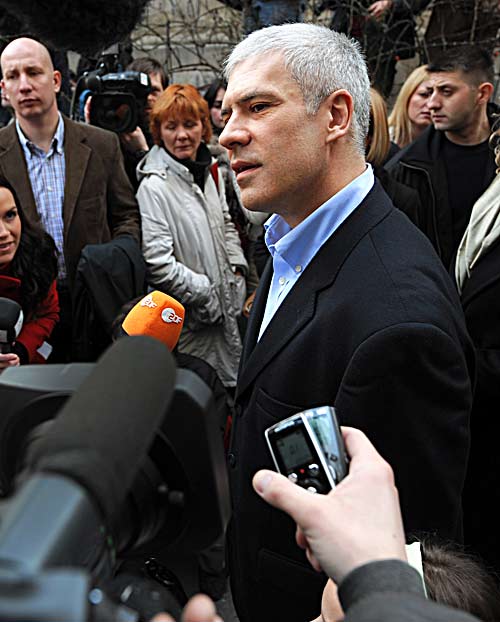Pro-European President wins Serbian elections

Your support helps us to tell the story
From reproductive rights to climate change to Big Tech, The Independent is on the ground when the story is developing. Whether it's investigating the financials of Elon Musk's pro-Trump PAC or producing our latest documentary, 'The A Word', which shines a light on the American women fighting for reproductive rights, we know how important it is to parse out the facts from the messaging.
At such a critical moment in US history, we need reporters on the ground. Your donation allows us to keep sending journalists to speak to both sides of the story.
The Independent is trusted by Americans across the entire political spectrum. And unlike many other quality news outlets, we choose not to lock Americans out of our reporting and analysis with paywalls. We believe quality journalism should be available to everyone, paid for by those who can afford it.
Your support makes all the difference.Serbian voters backed their pro-European President, Boris Tadic, in a dramatic election race last night.
The Central Electoral Commission announced that Mr Tadic had obtained 50.5 per cent of the votes cast, while the ultranationalist and pro-Russian candidate, Tomislav Nikolic, was close behind with 47.9 per cent of votes.
"Serbia is a European democracy," Mr Tadic said after the results. "We have shown the democratic potential of Serbia."
According to Zoran Lucic, the head of the prominent election monitoring group CeSID, the difference between the two was "a mere 100,000 votes". More than 4.5 million people showed up at polling stations yesterday, a turnout of 67.6 per cent and the highest turnout since the former President Slobodan Milosevic was ousted in 2000.
The commission later announced a 4 per cent lead for Mr Tadic.
The run-off presidential vote had a huge bearing on Serbia's future as Mr Tadic is now expected to steer the biggest state in the Balkans into the family of European nations. Mr Nikolic had led in the first round.
The ballot had been viewed as a final choice between European integration or the isolation of the past. Mr Tadic, 50, promised the road to the EU, despite all the obstacles the nation faces. Mr Nikolic stood for closer ties with Russia, often called the traditional ally of Serbia.
That would have meant the return of Serbia into the isolationist past of the 1990s, when Mr Nikolic's Radical Party ruled with the former president Milosevic.
Slovenia, which currently holds the European Union presidency, welcomed the re-election of Mr Tadic, the Democratic Party's leader. "The Serbian people seem to have confirmed their support to the democratic and European course of their country," the EU presidency said in a statement.
The tight result showed how Serbs remain deeply split over current political issues and on their recent past, analysts say. "Tadic won, my congratulations," Mr Nikolic said at his party headquarters. "I would like to call on everyone to stay calm," he added.
The President's tight victory came just as the UN-administered Serbian province of Kosovo is to declare independence. Its two million ethnic Albanians are expected to break away in the coming weeks. Although both candidates had opposed Kosovo's secession, Mr Tadic is believed by the international community to be the politician able to cushion the inevitable shock felt by Serbs.
And he does not oppose co-operation with the International Criminal Tribunal for the former Yugoslavia sitting in The Hague, where the Radicals' founder, Vojislav Seselj, is on trial for war crimes committed during the civil war.
However, to secure itsEuropean future, Serbia still has to hand over war criminals from the 1990s –the former Bosnian-Serb leader Radovan Karadzic and his military commander Ratko Mladic. The two are accused of ordering the executions of 7,000 Muslim men and boys in Srebrenica in 1995 – the biggest massacre in Europe since the Second World War.
Karadzic is believed to be hiding in the mountains of eastern Bosnia or northern Montenegro, while Mladic is believed to be in Serbia.
Join our commenting forum
Join thought-provoking conversations, follow other Independent readers and see their replies
Comments